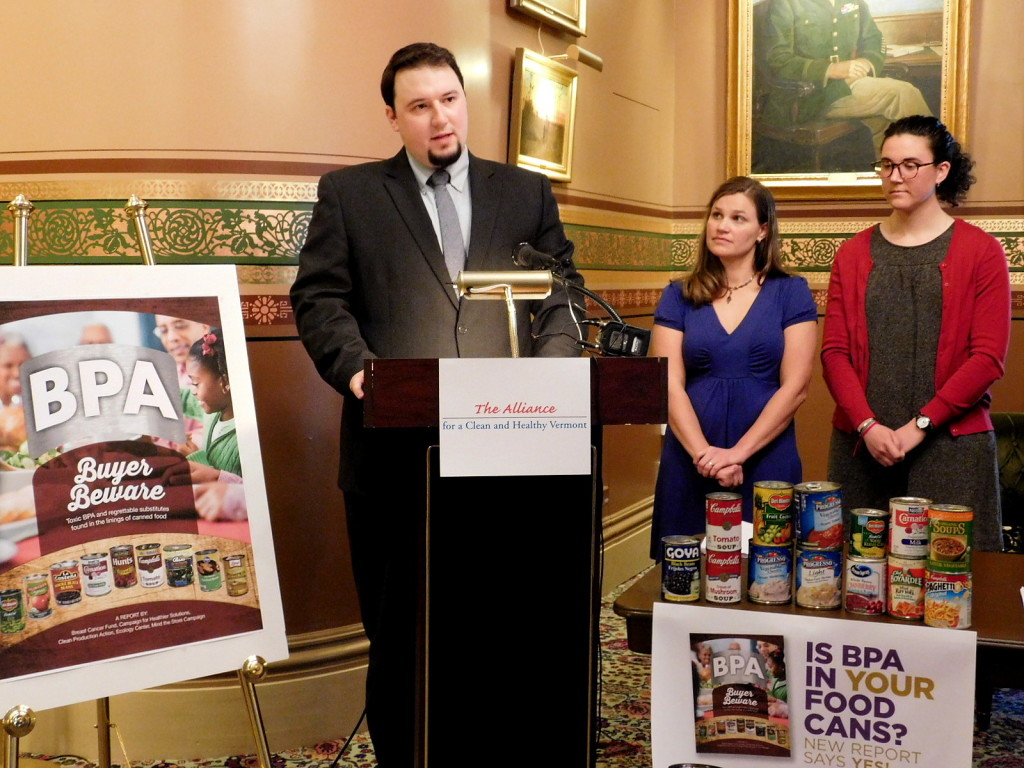VPIRG and members of the Alliance for Clean and Healthy Vermont co-released a new report produced by national partners today that found that the lining of two out of three cans tested contain the toxic chemical Bisphenol A (BPA).
BPA is an endocrine-disrupting chemical that negatively impacts our hormonal systems. Evidence suggests it may contribute to a host of harmful health effects including breast and prostate cancer, infertility, type-2 diabetes, obesity, asthma and attention deficit disorder. Other studies have demonstrated the capacity of BPA to migrate into food and then into people, raising concerns about exposures to low, but biologically relevant levels of BPA.
For the first time ever, this report also identified the replacement materials for BPA in can linings, and to what extent – if any — their safety has been studied.
“VPIRG has been one of the leading voices calling for a transparent and safe food system. This report shows we have a long way to go,” commented VPIRG Consumer and Environmental Advocate Falko Schilling. “We are calling on manufacturers to eliminate the use of BPA from food can linings and replace them with alternatives that have been proven to be safe.”
Buyer Beware: Toxic BPA & Regrettable Substitutes in the Linings of Canned Food was conceived and authored by the Breast Cancer Fund; Campaign for Healthier Solutions; Clean Production Action; Ecology Center; Environmental Defence (Canada); and Safer Chemicals, Healthy Families’ Mind the Store campaign. (The full report can be downloaded here.)
The report identified and analyzed the interior linings and lids of canned foods containing vegetables, fruits, soups, broth, gravy, milks and beans.
The findings were alarming:
- 100 percent of Campbell’s products sampled (15 of 15) contained BPA-based epoxy, while the company says they are making significant progress in its transition away from BPA. Upon learning about the upcoming report, Campbell’s announced yesterday they are eliminating BPA in North American cans by mid- 2017. While this is a step in the right direction, report authors state the announcement left out important details that we think would make this truly good news for Campbell’s soup lovers.
- Collectively, 62 percent of private-label, or generic food cans (71 out of 114) from retailers analyzed in the study tested positive for BPA-based epoxy resins, including Albertsons (including Randalls and Safeway), Dollar General, Dollar Tree (including Family Dollar), Gordon Food Service, Kroger, Loblaws, Meijer, Publix, Target, Trader Joe’s, and Walmart.
- BPA was found in private-label cans sold at both Target and Walmart, the largest grocery retailer in the United States. In their private label products, 100 percent of Target cans sampled (five out of five) and 88 percent of Walmart cans sampled (seven out of eight) tested positive for BPA-based epoxy resins.
- Discount retailers (commonly known as “dollar stores”) were among the laggards in transitioning away from BPA in can linings. Testing revealed that 83 percent of Dollar Tree and Family Dollar private-label cans (five out of six) and 64 percent of Dollar General private-label cans (nine out of 14) were coated with BPA-based epoxy resins. This is especially a problem because discount retailers are often the major retail outlet in low-income communities—which already face higher levels of BPA exposure. Broth and gravy cans were the most likely (100 percent of those sampled) to contain BPA in the can linings; corn and peas were the least likely category (41 percent of those sampled).
- On the positive side, Amy’s Kitchen, Annie’s Homegrown (recently acquired by General Mills), Hain Celestial Group, and ConAgra have fully transitioned away from BPA and have disclosed the BPA alternatives they’re using. Eden Foods reported eliminating the use of BPA-based epoxy liners in 95 percent of its canned foods and stated that it is actively looking for alternatives. Whole Foods has clearly adopted the strongest policy of the retailers surveyed in the report. Whole Foods reports that store brand buyers are not currently accepting any new canned items with BPA in the lining material.
What about the alternatives?
The report found that retailers and national brands that are phasing out BPA could be replacing it with regrettable substitutes. Identifying the safety of BPA alternatives is challenging, given the insufficient FDA review and approval of packaging additives and highly protected trade secrets in this product sector. However, the report found that:
- Aside from BPA, four major coating types were identified among the 192 cans tested including: acrylic resins including almost all oleoresin, polyester resins, and polyvinyl chloride (PVC) copolymers. There were multiple formulations of these compounds found, but no way to determine the specific chemicals used or how they are produced.
- 18 percent of retailers’ private-label foods and 36 percent of national brands were lined with a PVC-based copolymer that is made from highly hazardous chemicals including vinyl chloride, a known human carcinogen. PVC is considered a regrettable substitute.
- 33 percent of retailers’ private-label foods and 51 percent of national brands were lined with acrylic based polymers. Of the cans tested, 39 percent had a polystyrene-acrylic combination, of concern because styrene is considered a possible carcinogen.
- Much more research is needed to determine the safety of these compounds, and what may be migrating from the “alternative” can linings into food.
The report includes numerous recommendations including:
- National brands, grocery stores, big box retailers and dollar stores should eliminate and safely substitute BPA from all food packaging and label all chemicals used in can liners.
- In conjunction with the report release, advocates have launched a national online campaign calling on Kroger and Campbell’s to eliminate and safely substitute BPA. Congress should adopt comprehensive legislation to reform the FDA’s fatally flawed system for reviewing and approving the safety of packaging material.
- Consumers should choose fresh or frozen foods, or only purchase canned food from manufacturers and retailers that fully disclose the identity and safety of their can linings. Look for food packaged in other materials such as glass and Tetra Pak containers.

